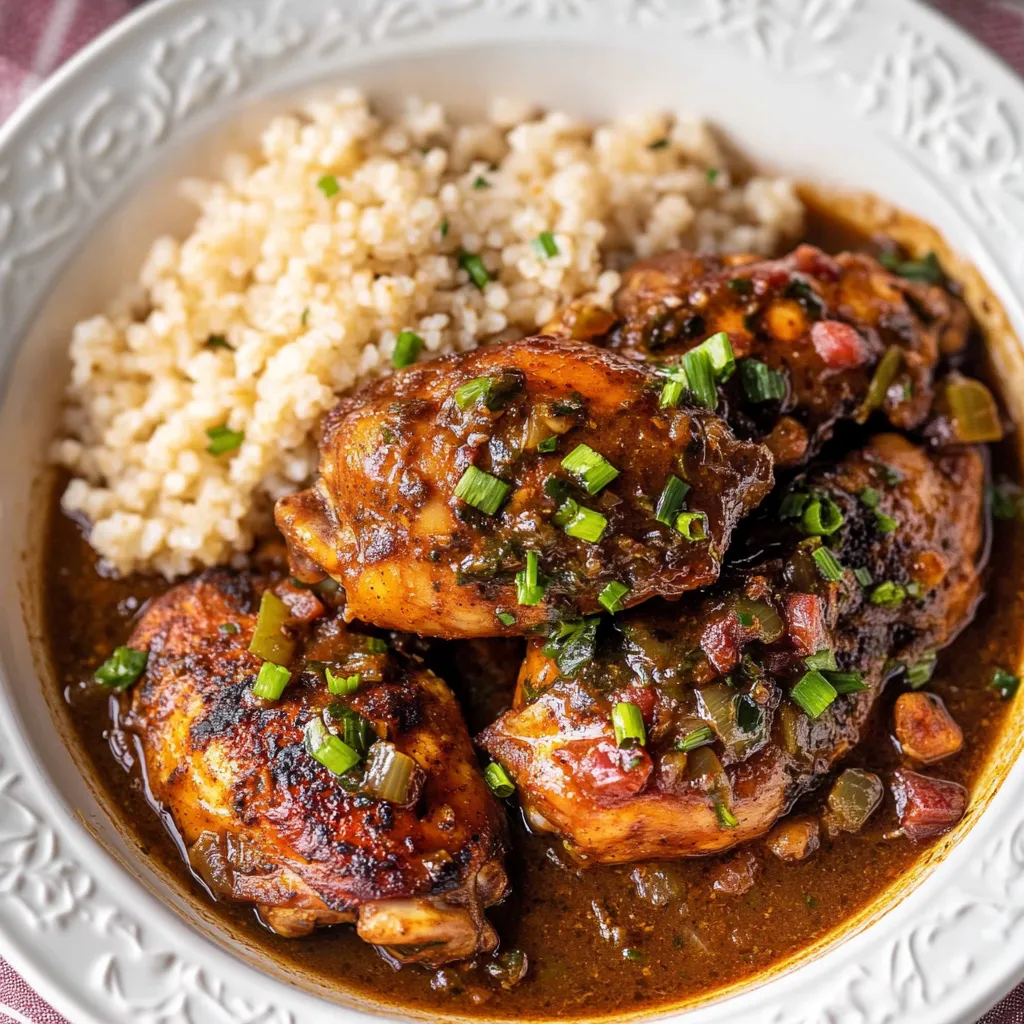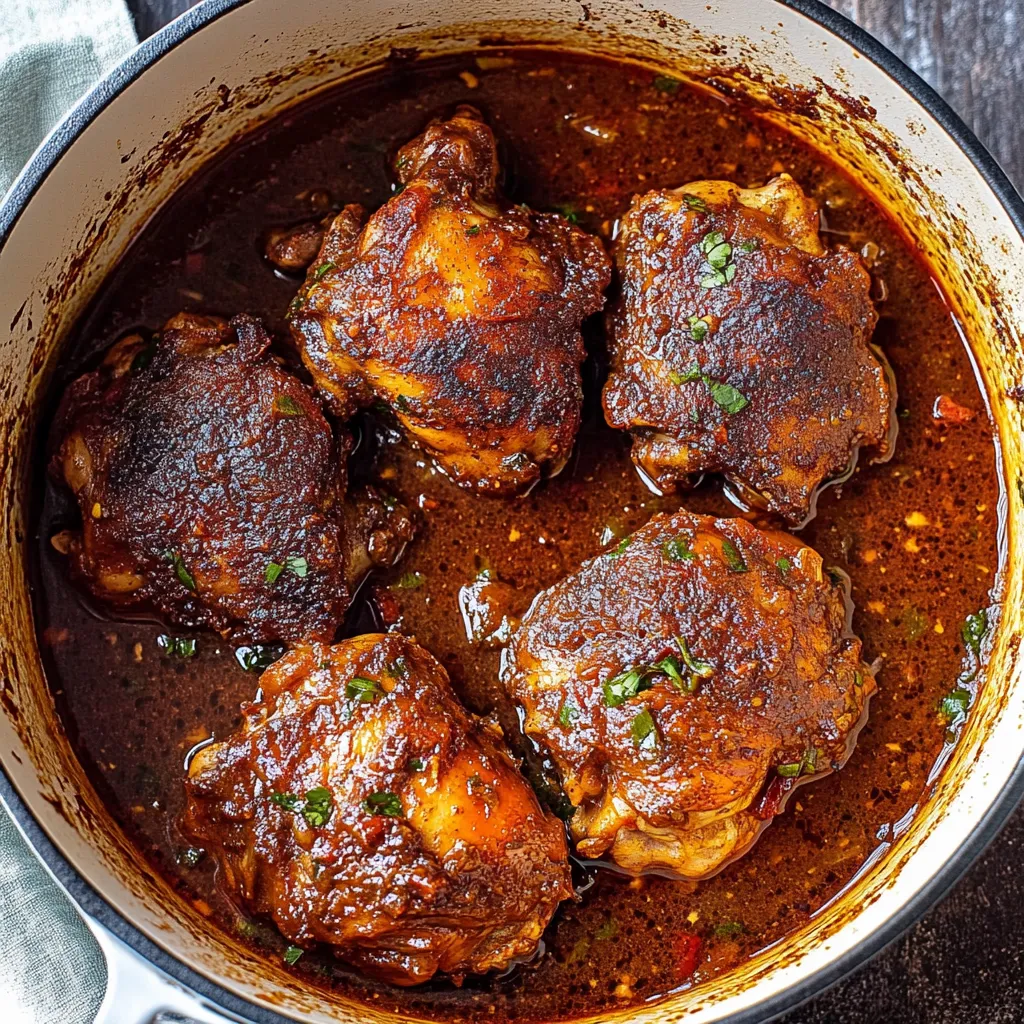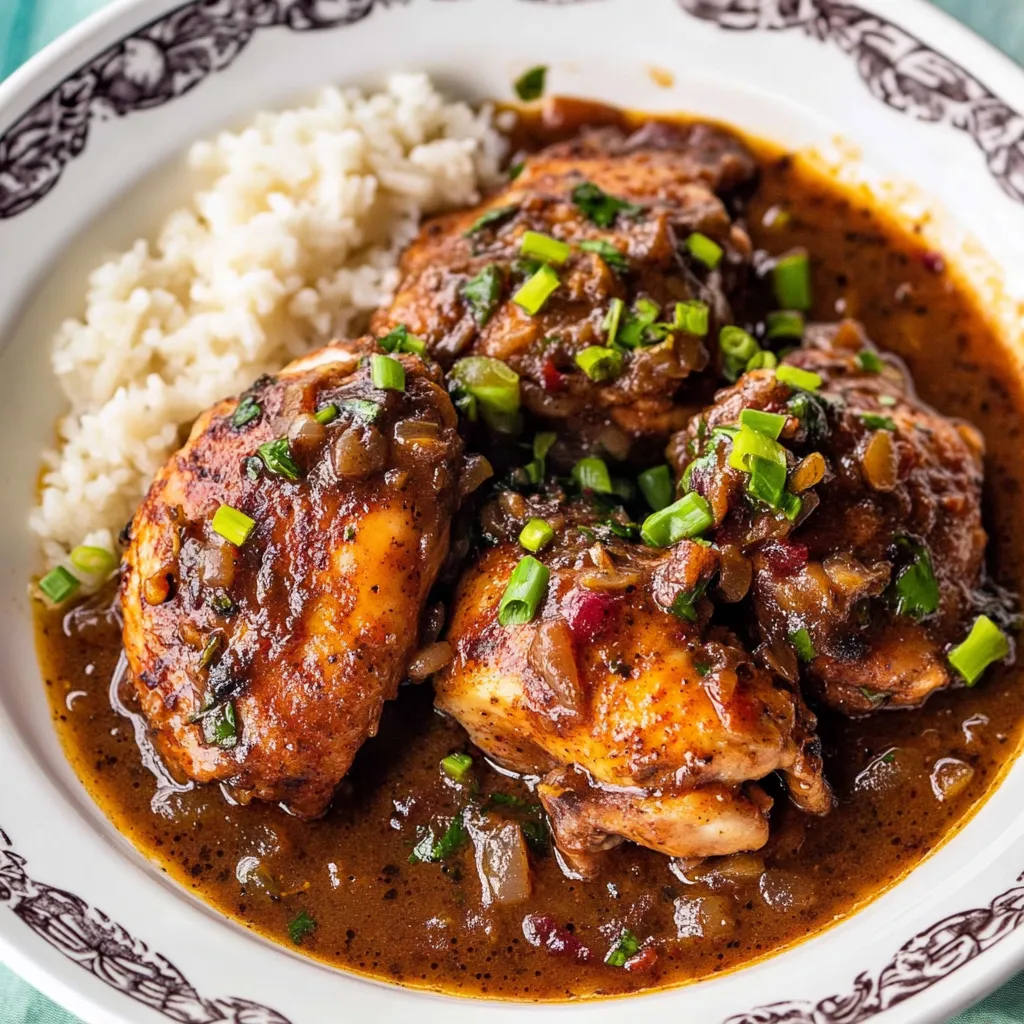 Pin it
Pin it
Braising chicken in a dark, spiced sauce creates a Jamaican comfort food that fills your kitchen with aromas you'll smell before you even open the door. The chicken marinates in browning sauce, allspice, thyme, and aromatics that penetrate deeply, then gets browned and simmered until it practically falls off the bone. That rich, dark gravy coats every piece with complex flavors that balance sweet, savory, and slightly spicy notes. Serving this over rice and peas makes a complete meal that tastes like you ordered from your favorite Caribbean restaurant, except you made it at home for a fraction of the price.
Caribbean food became fascinating to me after a Jamaican coworker brought brown stew chicken to a potluck and I couldn't stop eating it. The dark, glossy sauce looked almost intimidating but tasted incredible - sweet and savory with warming spices I couldn't quite identify. When I asked for the recipe, she laughed and said it was easier than I'd think but absolutely required browning sauce, which I'd never heard of. Finding that bottle in the international aisle opened up a whole new category of cooking. Now I make this regularly and my family requests it specifically for special dinners.
Ingredients and Why They Matter
- Chicken thighs and/or drumsticks (3 pounds, bone-in): Dark meat has enough fat to stay moist through braising; skin-on or skinless both work
- Yellow onion (1 large, roughly chopped): Aromatic base that sweetens during cooking
- Scallions (4-5, chopped): Add oniony flavor with green freshness
- Garlic (6 cloves, minced): Essential aromatic that builds depth
- Fresh ginger (2 tablespoons minced): Warming spice with slight heat
- Brown sugar (2 tablespoons): Balances savory elements and helps with browning; light or dark both work
- Browning sauce (3 tablespoons): Creates the signature dark color and adds caramelized flavor; brands include Grace, Kitchen Bouquet, or Gravy Master
- Salt (1½ teaspoons): Seasons deeply during marinating
- Paprika (1 tablespoon): Adds color and mild pepper flavor
- Ground allspice (1½ teaspoons): Quintessential Caribbean spice with warm, complex notes
- Dried thyme (1 tablespoon): Earthy herb that defines Jamaican cooking
- Black pepper (1 teaspoon): Adds subtle heat
- Bay leaves (2): Herbal depth that builds during braising
- Vegetable oil (2-3 tablespoons): For browning chicken
- Chicken broth (2 cups): Liquid base for the sauce
- Bell pepper (1 large, sliced): Adds sweetness and color; any color works
- Scotch bonnet or habanero pepper (1 whole): Fruity flavor without extreme heat when left whole
- Ketchup (3 tablespoons): Adds tomato sweetness and helps thicken sauce
How To Make It
- Marinate the chicken:
- In a very large bowl or gallon-size zip-top plastic bag, combine all the marinade ingredients - the chopped onion, scallions, minced garlic, minced ginger, brown sugar, browning sauce, salt, paprika, allspice, thyme, black pepper, and bay leaves. Stir or shake everything together briefly to mix. Add your chicken pieces and use your hands to massage the marinade into the meat, making sure every piece gets coated on all sides. The chicken will turn very dark brown from the browning sauce. Wear disposable gloves during this step if you want to keep your hands clean - the browning sauce stains skin temporarily. Cover the bowl with plastic wrap or seal the bag, pressing out excess air. Refrigerate for at least 1 hour, though overnight marinating creates much deeper flavor. The longer it sits, the more those spices and aromatics penetrate the meat. Turn the bag or stir the bowl once during marinating if you remember.
- Prepare chicken for browning:
- Remove the marinated chicken from the refrigerator about 30 minutes before cooking and let it sit at room temperature. This ensures even cooking instead of cold centers with overcooked exteriors. When ready to cook, remove each chicken piece from the marinade, using your fingers or tongs to scrape off and reserve the bits of onion, garlic, and herbs clinging to the meat. Place the scraped-clean chicken on a plate. Pour the entire marinade into a bowl and set it aside - don't discard it because you'll need it for the sauce. Those vegetables and all that flavoring will become part of the braising liquid. Let the chicken pieces air-dry slightly for about 10 minutes, which helps them brown better.
- Brown the chicken:
- Heat 2-3 tablespoons of vegetable oil in a large, heavy-bottomed pot, Dutch oven, or deep sauté pan over medium-high heat until shimmering. Working in batches to avoid crowding, add chicken pieces to the hot oil skin-side down if using skin-on chicken. Let them sear undisturbed for 2-3 minutes until deep golden brown, even approaching dark brown - don't worry if they look very dark because the sauce will even everything out. Flip and brown the other side for another 2-3 minutes. The chicken doesn't need to cook through now, just develop color and fond on the bottom of the pot. Transfer browned pieces to a clean plate and repeat with remaining chicken. Once all pieces are browned, carefully pour off all but about 2 tablespoons of the fat from the pot, leaving the dark browned bits stuck to the bottom.
- Build the sauce:
- Return the pot with reserved fat to medium heat. Pour in the reserved marinade with all its vegetables and aromatics. Stir and cook for 1-2 minutes until the onions start softening and releasing their aroma. Add the chicken broth and use a wooden spoon to scrape up all those dark, flavorful bits stuck to the pot bottom - this is called deglazing and captures tons of flavor. Add the sliced bell pepper, the whole Scotch bonnet or habanero pepper, and the ketchup. Stir everything together until smooth and combined. The mixture should look dark and rich. Make absolutely sure the Scotch bonnet pepper stays whole without any breaks or tears in its skin, or it will make the dish extremely spicy instead of subtly fruity.
- Braise the chicken:
- Return all the browned chicken pieces to the pot, nestling them into the sauce and turning to coat them evenly. Bring the mixture to a boil over medium-high heat, then immediately reduce heat to low. Cover the pot with a tight-fitting lid and maintain a gentle simmer - you should see just a few bubbles breaking the surface when you peek. Cook for 45 minutes, lifting the lid every 15-20 minutes to flip the chicken pieces so they braise evenly on all sides. The chicken is done when it's incredibly tender and nearly falling off the bone. A fork inserted should meet almost no resistance. If you want a thicker sauce, remove the lid and simmer for an additional 10-15 minutes to reduce and concentrate the liquid.
- Finish and serve:
- Carefully remove and discard the bay leaves and the whole Scotch bonnet pepper using tongs - don't let either break apart in the pot. Taste the sauce and adjust seasoning with additional salt or black pepper if needed. The sauce should coat the back of a spoon and have a glossy, rich appearance. Serve the chicken hot over rice - Jamaican rice and peas is traditional, or plain white rice works beautifully. Spoon plenty of that dark, flavorful sauce over everything. The chicken will be so tender it falls apart easily when you eat it, and that sauce soaks into the rice creating the perfect combination.
 Pin it
Pin it
Browning sauce became one of those ingredients I didn't know I was missing until I tried it. The first time I used it, I was shocked at how much it transformed the appearance and taste of the dish. That deep, almost black color looks so dramatic and professional, and the slightly caramelized, molasses-like flavor adds complexity you can't get elsewhere. Now I keep a bottle in my pantry and use it in gravies, stews, and braises beyond just this recipe. My local grocery store stocks it in the international aisle near other Caribbean products.
Understanding Browning Sauce
Browning sauce contains caramelized sugar, water, and sometimes seasonings or caramel coloring. Popular Caribbean brands like Grace have been making it for generations using traditional methods. It's similar to but distinct from products like Kitchen Bouquet or Gravy Master sold in American supermarkets, though those work fine as substitutes. The sauce adds both color and a subtle molasses-like sweetness with hints of caramel. Making your own involves carefully caramelizing brown sugar until very dark, then carefully adding water to create syrup. Store-bought versions taste consistent and save the risk of burning sugar, but homemade works when you can't find commercial brands.
Marinating Benefits
Long marinating doesn't just add flavor - it actually changes the meat's texture. The salt in the marinade begins breaking down proteins, allowing moisture to be retained better during cooking. Acids from ingredients like the tomatoes in ketchup tenderize slightly. The oil helps carry fat-soluble flavors into the meat. All those aromatics - garlic, ginger, scallions, onions - have time to penetrate past the surface. Overnight marinating creates noticeably more flavorful chicken than just 1-2 hours, though even the minimum time produces good results. Don't marinate longer than 24 hours because the texture can become mushy rather than tender.
Braising Technique
Braising combines dry-heat browning with wet-heat simmering to create tender, flavorful results. The initial browning develops fond - those browned bits stuck to the pan - that contributes deep, complex flavor when dissolved into the sauce. The long, slow simmer in liquid breaks down tough connective tissues in dark meat, making it fork-tender. Covering the pot traps moisture and heat, creating a gentle cooking environment. Flipping chicken pieces ensures even braising. The sauce reduces and concentrates, becoming thicker and more flavorful. This method works beautifully for tough cuts that would be dry with quick cooking methods.
Spice Level Management
Scotch bonnet and habanero peppers rank among the hottest chile peppers, measuring 100,000-350,000 Scoville units. However, when used whole without breaking, they add fruity, almost sweet undertones without extreme heat. The capsaicin that creates heat concentrates in the seeds and inner membranes. As long as the pepper stays intact, very little capsaicin leaches into the sauce. If the pepper breaks or bursts during cooking, the dish becomes much spicier. Some cooks pierce the pepper once or twice with a knife tip to release more heat intentionally. For heat-sensitive eaters, omit the pepper entirely, though you'll miss the subtle fruit notes it contributes.
Serving Suggestions
Brown stew chicken traditionally pairs with rice and peas (rice cooked with kidney beans and coconut milk), which is the quintessential Jamaican side. Plain white rice or coconut rice also work beautifully, soaking up that rich, dark sauce. Fried plantains add sweet contrast. Steamed cabbage or a simple green salad provides fresh crunch. Hard dough bread lets you mop up every drop of sauce. Macaroni and cheese is common at Caribbean restaurants. For a complete Jamaican experience, serve with festival (fried cornmeal dumplings) or bammy (cassava flatbread). The meal feels complete and satisfying with just chicken, rice, and one vegetable side.
Storage and Reheating
Brown stew chicken often tastes even better the next day after flavors have melded overnight. Store in an airtight container refrigerated for up to 4 days. The sauce will thicken significantly when cold - this is normal. Reheat gently on the stovetop over low heat, adding a splash of water or broth if needed to thin the sauce back to proper consistency. Microwave reheating works too at reduced power, stirring halfway through. Freeze portions in freezer-safe containers for up to 3 months. Thaw overnight in the refrigerator before reheating. The bone-in chicken holds up beautifully to freezing and reheating without becoming dry or stringy.
Boneless Adaptation
While bone-in chicken is traditional and contributes flavor to the sauce, boneless thighs work when convenience matters. Use about 2½ pounds boneless, skinless thighs. Marinate as directed. Brown for 2 minutes per side. Reduce braising time to about 30-35 minutes since boneless meat cooks faster than bone-in. The chicken may break apart more toward the end of cooking, but it still tastes delicious. Boneless chicken creates slightly less rich sauce because bones add gelatin that thickens and enriches braising liquid. Consider adding an extra ½ cup of broth to compensate for the missing bone contribution.
 Pin it
Pin it
This Jamaican brown stew chicken represents the kind of cooking that connects you to a culture's culinary traditions through authentic flavors and techniques. The dark, glossy sauce clinging to fall-apart-tender chicken looks as impressive as it tastes, and the complex spice blend creates flavors you can't quite deconstruct but absolutely love. When you serve a pot of this with rice and watch everyone go back for seconds and thirds, you know you've made something special. Sometimes the best recipes are the ones that transport you somewhere else through taste and aroma, and this Caribbean classic definitely accomplishes that goal perfectly every single time you make it.
Frequently Asked Questions
- → Can I use chicken breasts instead of thighs?
- You can, but thighs and drumsticks stay more tender and juicy during the long cooking time. If using breasts, reduce cooking time to about 30 minutes.
- → How spicy is this brown stew chicken?
- It's mildly spicy with warm flavors from the spices. The whole Scotch bonnet adds flavor without much heat since it stays intact. Remove it before it breaks open if you want less spice.
- → What is browning sauce and where can I find it?
- Browning sauce is a Caribbean ingredient that adds color and slight sweetness. You can find it in the international aisle or online. In a pinch, use soy sauce or skip it.
- → Can I make this ahead of time?
- Absolutely! This dish tastes even better the next day after the flavors have melded. Store it in the fridge for up to 3 days and reheat gently on the stove.
- → What should I serve with brown stew chicken?
- Rice and peas is the traditional pairing, but coconut rice, white rice, or even mashed potatoes work great. Add a simple salad or steamed vegetables on the side.
- → Do I need to marinate the chicken overnight?
- One hour is the minimum, but overnight marinating gives deeper flavor. If you're short on time, even 30 minutes will help, though the taste won't be as developed.
